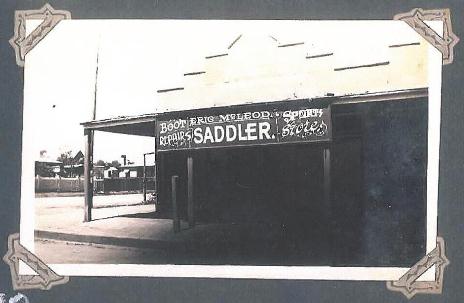A BUSHRANGER PLAYED TRUANT AND SCOURED OUR BUSHLAND
Stan Wenban, a craggy, articulate man of the bush, is the grand old character of Manildra town.
And at 91 he’s obstinate about one thing – he’s a bushranger – and “I’ve been one all my life”. He’s scoured the bush and highways from Manildra to Muswellbrook. He began in the footsteps of Ned Kelly, he’ll tell you, back in the early 1900s while he was still at school.
Mostly he played truant and spent his hours “plundering”. He poked his bent thumb behind him – “I’d be after anything at all. I’d just take to the hills. “I’d rob hives for honey and nests for eggs”.
The days he did make it all the way to the schoolhouse at Meranburn, just out of Manildra town, he’d be more the predator. “When we used to go to school … boys and girls … there was no difference … not the way they go on with all this nonsense today”. He broke out in a mischievous grin. “Well, mostly no difference”.
There was that day “we were caught with the girls down in the creek swimming on our way home from school”. Skinny dipping? He tossed that word aside. “Naked, you mean, don’t you?” The euphemism annoyed him. He answered his own question. “Of course, we’d have all got flogged for wetting our clothes”.
Locked up…
Mr Anderson, Meranburn’s schoolmaster, locked the boys up in the schoolhouse, after that, until the girls were safely home. “The last straw came the day the teacher went home and forgot us. “It was dark and we had to break a window to get out.”
The bushranger took to the hills after that – out on farms, fencing, labouring, wheat lumping – any job he could get. Then later, through the depression, it was out on the highways, in true bushranger style, with a truck load of hives.
He travelled all over the State, camping on roadsides wherever “there were blossoms for the bees”. It was bee farming in a big way with 350 hives. He mostly kept to the Bega and Muswellbrook areas. His daughter, Freda, went along too. There was money in it. “I made 30/- a tin and some years there were 7 or 8 tins, maybe 10”. He kept on bee farming until four years ago when he sold his hives to an Orange apiarist.
Now the old bushranger sits most of his day on his front verandah, just a few feet from the bed where he sleeps “out in the open, under the stars” with a foxskin rug for warmth. He faces toward Manildra town on the tiny verandah of the cottage he built himself back in 1914 – watering his tomato plants he means to plant out as soon as the frosts have gone. “I’ve seen every house built on this side of the creek except the railway house that was there in 1892. He’s proud of that. There was no hesitation with the date. He rolls off memories, slotted accordingly with the dates, as though he was speaking about yesterday. He falters, every once in a while, shakes his head and apologises “I’m slipping, you know”. At 91, he warns you affably, he’s “crot-chety”. “It’s my hip. It gets in the way”.
He’s been around. He’s roamed away for months at a time, but always comes back home – to Manildra.
A man doesn’t leave the house he’s built, himself, from timber he cut, himself. “My brother-in-law and I knocked this house up in 21 days. He bought the wood for just 6/- a hundred feet. He certainly wouldn’t leave the home he built for his wife, Edith and shared with her until her death 13 years ago. It is the home where they’d raised their family of five – Isabel (Mrs Stammers, Cudal); Fred (Sydney); Freda (who lives with her father in Manildra); Marie and Ruth, both in Sydney. He scoffs at the suggestion he’s a sentimental bloke. “I’m a bushranger” he corrects.
Stan Wenban drove his own car – a Holden station wagon – until his 90th year “with never an accident”. He still garages his sturdy wagon in the shed behind his home.
Stan Wenban is as much a part of Manildra as its flour mills, its piggery, its Amusu Theatre – and that railway house that happened to get “this side of the creek” before Stan. He’s been the town’s critic and its admirer. His blunt, obtuse manner camouflages his concern, his dry wit and his unabashed sentimentality. His sensitivity is part of his nature he pretends to deny.
He’s been the town’s greenkeeper – “I planted the bowling greens down” – and the town undertaker. When his brother-in-law, Arthur Cole, went away for a while to work at Wunderlichs in Sydney, Stan took over the burying in Manildra. “Arthur left me the coffins all made up. Only trouble was they were full size jobs. “Three young children died when he was gone so I had to knock them up myself. “Very sad, it was, very sad. I didn’t mind handling the dead you know, until I had to bury those kiddies…”.
Long life…
Stan’s father, Frederick Wenban was a teamster after he sold his farm at Red Hill. He lived to 101. Stan hopes to make that too. What’s his recipe for longevity? Does he drink or smoke? “I smoked once, my father’s pipe when I was five and never touched it again. I enjoy a beer or two – no more – and I’ve never been drunk. Never”.
It was his turn for a question. “You know why I’m still here?” He tapped his cane against the verandah. “It’s because I’m a bushranger, that’s why”. He laughed at his own persistence. It’s a healthy life – out stalking the hills.
Bibliography:
Central Western Daily 1982, ‘Businesses survive a century’, Manildra Public School Centenary supplement, 21 October, p.9.


